Estimated reading time: 13 minutes
This is the ultimate guide to creating a study plan. Use this guide to get organized and maximize your potential!
This post may contain affiliate links, which means I’ll receive a commission if you purchase through my link, at no extra cost to you. Please read full disclosure here.
As an Amazon Affiliate I earn from qualifying purchases.
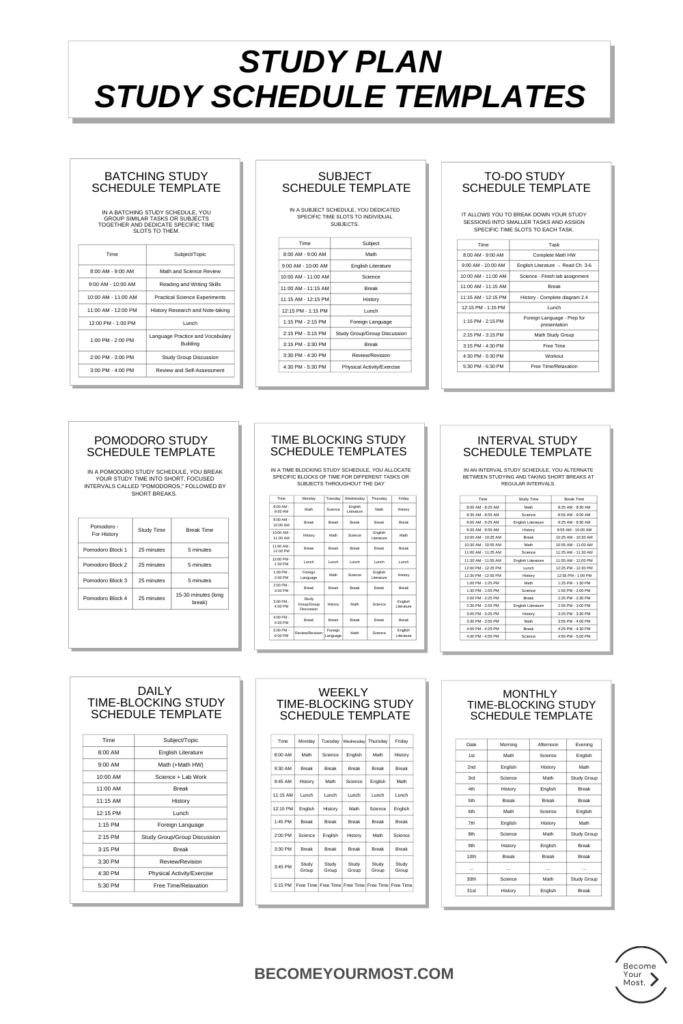
WHY HAVE A STUDY PLAN?
A well-structured study plan can help you stay organized, manage your time efficiently, and maximize your learning potential.
Having a study plan provides several benefits:
- Organization: A study plan helps you organize your study materials, resources, and goals systematically. It ensures that you have a clear roadmap of what needs to be accomplished and when.
- Time Management: With a study plan, you can allocate specific time slots for studying different subjects or topics. This helps you utilize your time effectively and avoid procrastination. By following a schedule, you are less likely to waste time and more likely to stay focused and productive.
- Goal Clarity: A study plan allows you to define your learning objectives and set clear goals. It helps you identify what you want to achieve through your study sessions. This clarity of purpose keeps you motivated and on track.
- Efficient Learning: By organizing your study materials and breaking down complex topics into manageable chunks, a study plan enables you to approach your learning in a structured manner. This helps in better comprehension and retention of information.
Here are more reasons to have a study plan:
- Reduced Stress: With a study plan, you have a sense of control over your studies. It reduces the feeling of being overwhelmed and helps you tackle your tasks in a more manageable way. This can significantly reduce stress and anxiety associated with exams or deadlines.
- Tracking Progress: A study plan allows you to track your progress and monitor your achievements. It helps you identify areas where you may need to allocate more time or revise certain topics. This way, you can stay accountable and make necessary adjustments to ensure continuous improvement.
Overall, a study plan provides direction, organization, and structure to your learning journey. It empowers you to make efficient use of your time, enhance your understanding, and achieve your academic goals. By following a well-designed study plan, you can approach your studies with confidence and increase your chances of success.
WHY HAVE A STUDY SCHEDULE?
Having a study schedule is important for several reasons:
- Organization and Time Management: A study schedule helps you stay organized and effectively manage your time. It allows you to allocate specific time slots for studying different subjects or topics, ensuring that you cover all the necessary material and avoid procrastination. With a schedule in place, you are less likely to waste time and more likely to stay focused and productive.
- Consistency and Habit Formation: A study schedule helps you establish a consistent study routine. By studying at consistent times and for consistent durations, you develop a habit of regular studying. This habit makes it easier to stay motivated, reduces the chance of skipping study sessions, and maximizes your learning potential.
- Goal Setting and Progress Tracking: A study schedule allows you to set clear goals and track your progress toward those goals. By breaking down your study material into smaller tasks and assigning specific time slots to each task, you can measure your progress and stay accountable. This helps you stay on track and gives you a sense of accomplishment as you complete each task.
- Efficient Learning and Retention: A study schedule enables you to approach your learning in a structured manner. By allocating dedicated time to each subject or topic, you can focus on understanding and mastering one concept at a time. This approach promotes better comprehension and retention of information, leading to more effective learning outcomes.
Here are some more:
- Reduced Stress and Anxiety: With a study schedule, you have a clear plan of action, which reduces the feeling of being overwhelmed. Knowing what needs to be done then gives you a sense of control over your studies, reducing stress and anxiety associated with exams or deadlines.
- Balanced Workload: A study schedule helps you distribute your study workload evenly across different subjects or topics. By allocating appropriate time to each area of study, you can ensure that no subject is neglected or given excessive focus. This balanced approach allows for a comprehensive and well-rounded understanding of the material.
Overall, having a study schedule is crucial for effective time management, organization, and goal achievement. It helps you make the most of your study sessions, enhances your learning experience, and increases your chances of academic success.
How To Create A Study Schedule
STEP 1: SET CLEAR GOALS
Before diving into creating a study plan, it’s important to define your goals.
- Identify what you want to achieve through your study sessions.
- Are you aiming to improve your grades, gain a deeper understanding of a subject, or prepare for a specific exam?
- Setting clear goals will give your study plan a sense of direction.
- Identify what resources you will need to achieve your study goals.
- Will you require textbooks, online materials, or additional study aids?
- Ensure that you have access to the necessary resources to support your learning.
STEP 2: ASSESS YOUR CURRENT SITUATION
Take some time to evaluate your current study habits and schedule. Understand how you currently allocate your time for studying and identify any areas of improvement.
Reflect on what study methods work best for you and what times of the day you are most productive.
STEP 3: PRIORITIZE AND ORGANIZE
Once you have a clear understanding of your goals and current study habits, it’s time to prioritize and organize your study materials. Break down the topics or subjects you need to cover and prioritize them based on importance and difficulty level. Create a study schedule that allocates sufficient time for each subject while considering your energy levels throughout the day.
STEP 6: BREAK IT DOWN
Avoid overwhelming yourself by breaking down your study sessions into smaller, manageable tasks. Set specific study goals for each session and track your progress. Celebrate the completion of each task, as it will motivate you to continue with the rest of your study plan.
STEP 7: USE EFFECTIVE STUDY TECHNIQUES
Experiment with different study techniques to find what works best for you. Some effective techniques include active learning, summarizing information in your own words, using mnemonic devices, and practicing with past exams or sample questions. Incorporate these techniques into your study plan to enhance your understanding and retention of the material.
By following these steps, you can create a personalized study plan that suits your learning style and helps you achieve your academic goals. Remember to stay disciplined, stay motivated, and make the most out of your study sessions.
What Are Some Different Types of Study Schedules?
When creating a study schedule, it’s important to consider how to break it down either by workload or time:
Breaking down your study schedule by workload involves grouping similar tasks or subjects and dedicating specific time slots to them. This approach allows you to focus on related topics and optimize your study sessions.
Breaking down your study schedule by time involves allocating specific blocks of time for different tasks or subjects throughout the day. This helps you stay organized, manage your time effectively, and ensure that you cover all the necessary material.
Whether you choose to break down your study schedule by workload or time, the key is to find a method that works best for you and allows you to stay focused, motivated, and productive during your study sessions.
1. Breaking Down The Workload By Workload
- Batching Study Schedule: In a batching study schedule, you group similar tasks or subjects and dedicate specific time slots to them. This approach allows you to focus on related topics and optimize your study sessions.
- Subject Schedule: A subject schedule involves dedicating specific time slots to individual subjects. This allows you to allocate sufficient time for each subject and maintain a balanced study routine.
- To-Do Schedule: A to-do schedule focuses on prioritizing and organizing your study tasks and activities. It helps you manage your workload effectively and ensures you stay on track with your study goals.
2. Breaking Down The Workload By Time
- Pomodoro Technique: This technique involves breaking your study time into short, focused intervals (typically 25 minutes) called “Pomodoros,” followed by short breaks (usually 5 minutes). After four Pomodoros, take a longer break (around 15-30 minutes). This method helps improve focus and productivity.
- Time Blocking: In this method, you allocate specific blocks of time for different tasks or subjects throughout the day. For example, you can dedicate the morning to studying math, the afternoon to reading and writing, and the evening to practicing a foreign language.
Types of Time Blocking
- Daily Study Schedule: A daily study schedule is an effective tool for organizing your study time and maximizing your productivity. By allocating specific time slots for different subjects or topics, you can ensure that you cover all the necessary material and avoid procrastination. With a well-designed daily study schedule, you can stay focused, manage your time efficiently, and achieve your academic goals.
- Interval Study Schedule: This schedule involves alternating between studying and taking short breaks at regular intervals. For example, study for 1 hour and then take a 30-minute break. Repeat this cycle throughout your study session.
- Weekly Study Schedule: Plan your study schedule on a weekly basis, allocating specific subjects or topics to each day of the week. This allows for a more structured and organized approach to studying, ensuring that you cover all the necessary material over the course of the week.
- Monthly Study Schedule: For long-term planning, you can create a monthly study schedule. Assign specific subjects or topics to different days of the month, allowing you to spread out your study workload and have a comprehensive study plan.
These are different types of study schedules that you can try to find the one that works best for you. Experiment with these approaches, customize them according to your preferences and needs and see which one helps you stay focused, motivated, and productive during your study sessions.
Study Schedule Templates
BATCHING STUDY SCHEDULE
In a batching study schedule, you group similar tasks or subjects together and dedicate specific time slots to them.
For example:
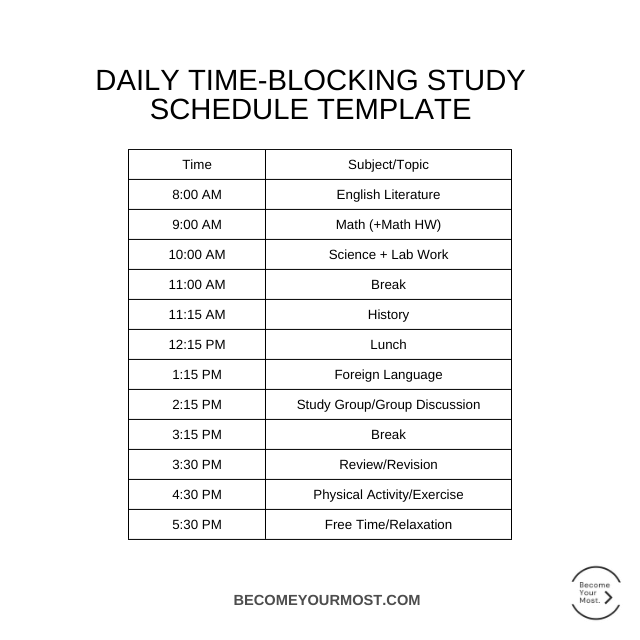
SUBJECT SCHEDULE TEMPLATE
In a subject schedule, you dedicate specific time slots to individual subjects. Here’s an example:
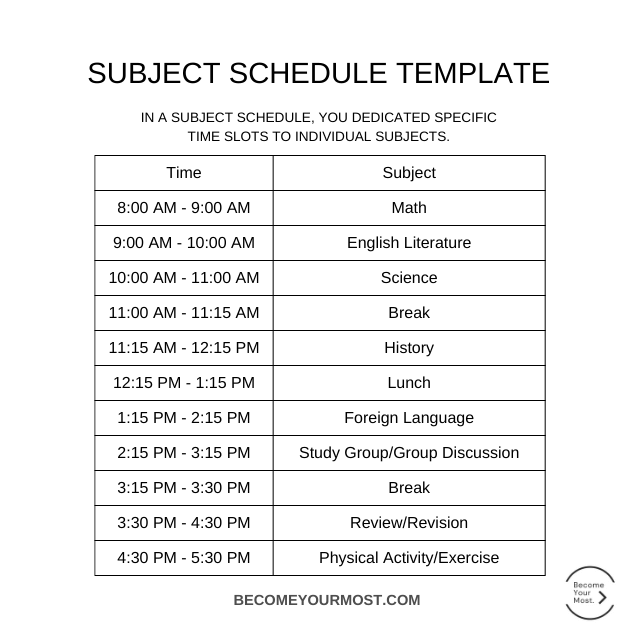
TO-DO STUDY SCHEDULE TEMPLATE

POMODORO STUDY SCHEDULE TEMPLATE
In a Pomodoro study schedule, you break your study time into short, focused intervals called “Pomodoros,” followed by short breaks. Here’s an example:

Repeat this cycle throughout your study session. Adjust the number of Pomodoros and break durations according to your preference and productivity level.
Remember to stay focused and take regular breaks to maintain productivity and avoid burnout.
TIME BLOCKING STUDY SCHEDULE TEMPLATES
In a time-blocking study schedule, you allocate specific blocks of time for different tasks or subjects throughout the day. This template provides a general structure that you can customize according to your specific needs:

Daily Time-Blocking Study Schedule Template

Weekly Time-Blocking Study Schedule Template
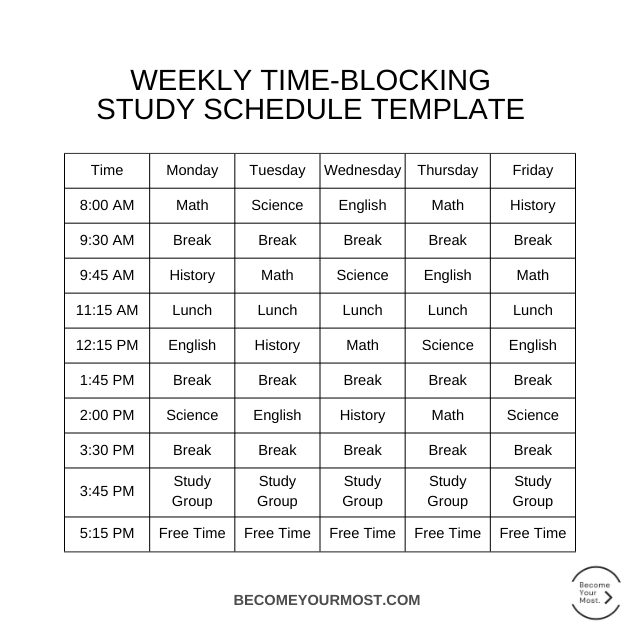
Monthly Time-Blocking Study Schedule Template
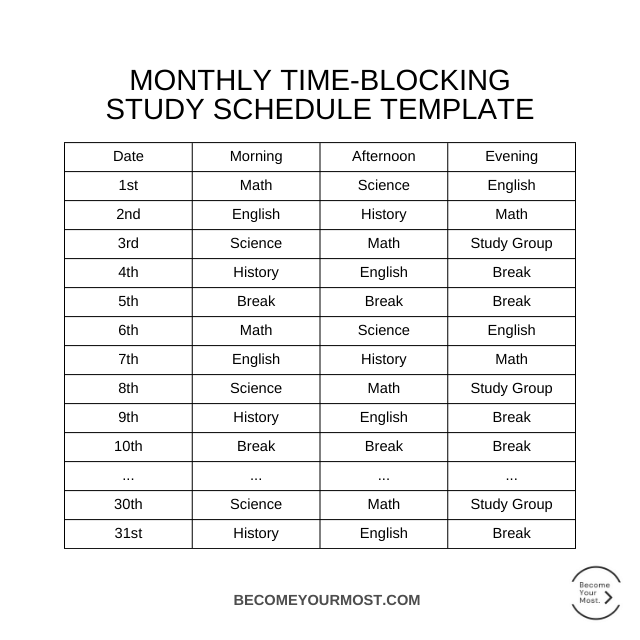
INTERVAL STUDY SCHEDULE TEMPLATE
In an interval study schedule, you alternate between studying and taking short breaks at regular intervals. Here’s an example:

Repeat this cycle throughout your study session, adjusting the study and break durations according to your preference and productivity level.
Remember to stay focused during study time and take regular breaks to maintain productivity and avoid burnout.
Regardless of the format you choose, time blocking helps you stay organized, establish a consistent study routine, and effectively manage your time.
It allows you to allocate dedicated time for each subject or task, ensuring that you cover all the necessary material and make progress toward your study goals.
By following a well-structured time-blocking schedule, you can enhance your learning experience, reduce stress, and increase your chances of academic success.
Summary
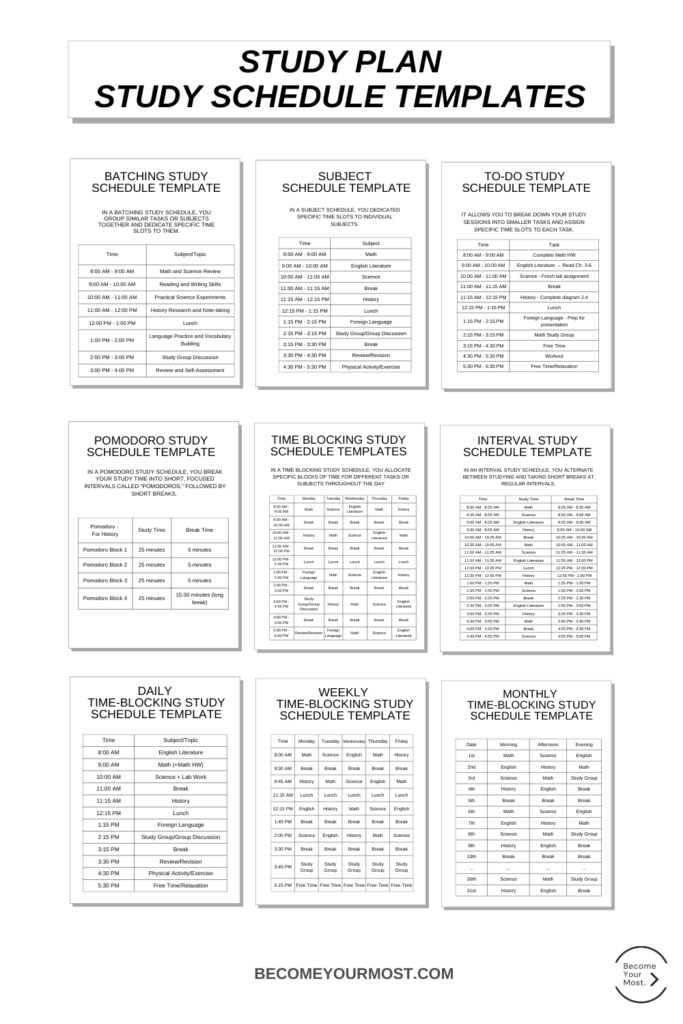
This post was all about the importance of creating a study plan and study schedule to enhance your learning experience and maximize your academic potential.
A well-structured study plan provides organization, time management, goal clarity, efficient learning, reduced stress, and progress tracking. It helps you stay focused, motivated, and accountable, ensuring that you cover all the necessary material and make continuous improvements.
Similarly, a study schedule allows for effective time management, consistency, habit formation, goal setting, efficient learning, reduced stress, and a balanced workload. It helps you establish a study routine, track your progress, and approach your learning in a structured manner.
By following the steps to create a study plan and study schedule, setting clear goals, assessing your current situation, prioritizing and organizing, breaking down tasks, using effective study techniques, and customizing the schedule to your preferences, you can optimize your study sessions and increase your chances of academic success.
Remember, a study plan and study schedule are flexible tools that can be tailored to your specific needs and learning style. Experiment with different approaches, find what works best for you, and stay disciplined and motivated throughout your academic journey.
So, start creating your study plan and study schedule today, and unlock your full learning potential!





